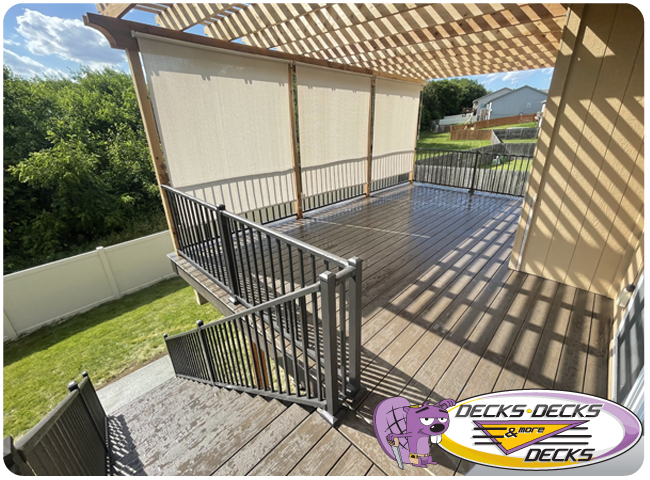Are Composite Decks Hotter Than Wood?
When it comes to choosing the perfect material for your deck, one common question that arises is: Are composite decks hotter than wood? Understanding the thermal properties of both materials is crucial, especially if you plan to spend a lot of time on your deck during warm weather. In this post, we’ll explore the temperature differences between composite and wood decks, the factors that influence these temperatures, and practical tips to keep your deck cool.
Understanding Composite Decks and Wood Decks
Composite Decks: Composite decking is made from a combination of wood fibers and plastic. This blend creates a durable, low-maintenance material that resists rot, splintering, and insect damage. Composite decks are available in a wide range of colors and styles, often designed to mimic the appearance of natural wood.
Wood Decks: Wood decks, on the other hand, are made from natural lumber. Popular wood choices include cedar, redwood, and pressure-treated pine. Wood decks offer a classic, natural look and can be stained or painted to suit your preferences. However, they require more maintenance than composite decks to prevent issues like rot and insect damage.
Temperature Differences Between Composite and Wood Decks
One of the main concerns for homeowners is the temperature of their deck surface, especially in the summer months. Here’s a closer look at how composite and wood decks compare in terms of heat retention:
Heat Retention of Composite Decks:
- Composite decking tends to retain more heat than wood.
- The plastic components in composite decks absorb and retain heat more efficiently than natural wood.
- Darker-colored composite decks can become especially hot under direct sunlight.
Heat Retention of Wood Decks:
- Wood generally stays cooler than composite materials.
- Natural wood has a porous structure that allows it to dissipate heat more effectively.
- Lighter-colored woods, such as cedar or redwood, tend to stay cooler than darker woods or composite materials.

Factors Influencing Deck Temperature
Several factors can influence the temperature of your deck, regardless of the material:
- Color: Darker colors absorb more heat, while lighter colors reflect it. Choosing a lighter shade for your deck can help keep it cooler.
- Sun Exposure: Decks in full sun will naturally become hotter than those in shaded areas. Consider the orientation of your deck and the amount of direct sunlight it receives.
- Ventilation: Good airflow can help reduce the temperature of your deck surface. Ensure there is adequate spacing between deck boards and consider using a pergola or shade structure to provide relief from the sun.
Practical Tips to Keep Your Deck Cool
Regardless of whether you choose composite or wood decking, there are several strategies you can use to keep your deck cool:
- Use Outdoor Rugs: Placing outdoor rugs on your deck can provide a cooler surface to walk on and reduce heat absorption.
- Install a Pergola: A pergola or other shade structure can block direct sunlight and significantly lower the temperature of your deck.
- Opt for Lighter Colors: Choose lighter-colored decking materials to reflect more sunlight and absorb less heat.
- Incorporate Planters and Greenery: Adding plants and greenery around your deck can create shade and help cool the surrounding area.
- Use a Cooling Deck Paint: Some paints and coatings are designed to reflect sunlight and reduce surface temperatures. Applying a cooling deck paint can help keep your deck more comfortable.
Conclusion
In conclusion, composite decks do tend to get hotter than wood decks, primarily due to their plastic content and color choices. However, by understanding the factors that influence deck temperature and implementing practical cooling strategies, you can enjoy your outdoor space comfortably, regardless of the material you choose. Whether you prefer the low maintenance of composite decking or the natural appeal of wood, there are ways to ensure your deck remains a cool and inviting retreat during the warmest months of the year.

